Healing on the Homefront
How Emory serves veterans
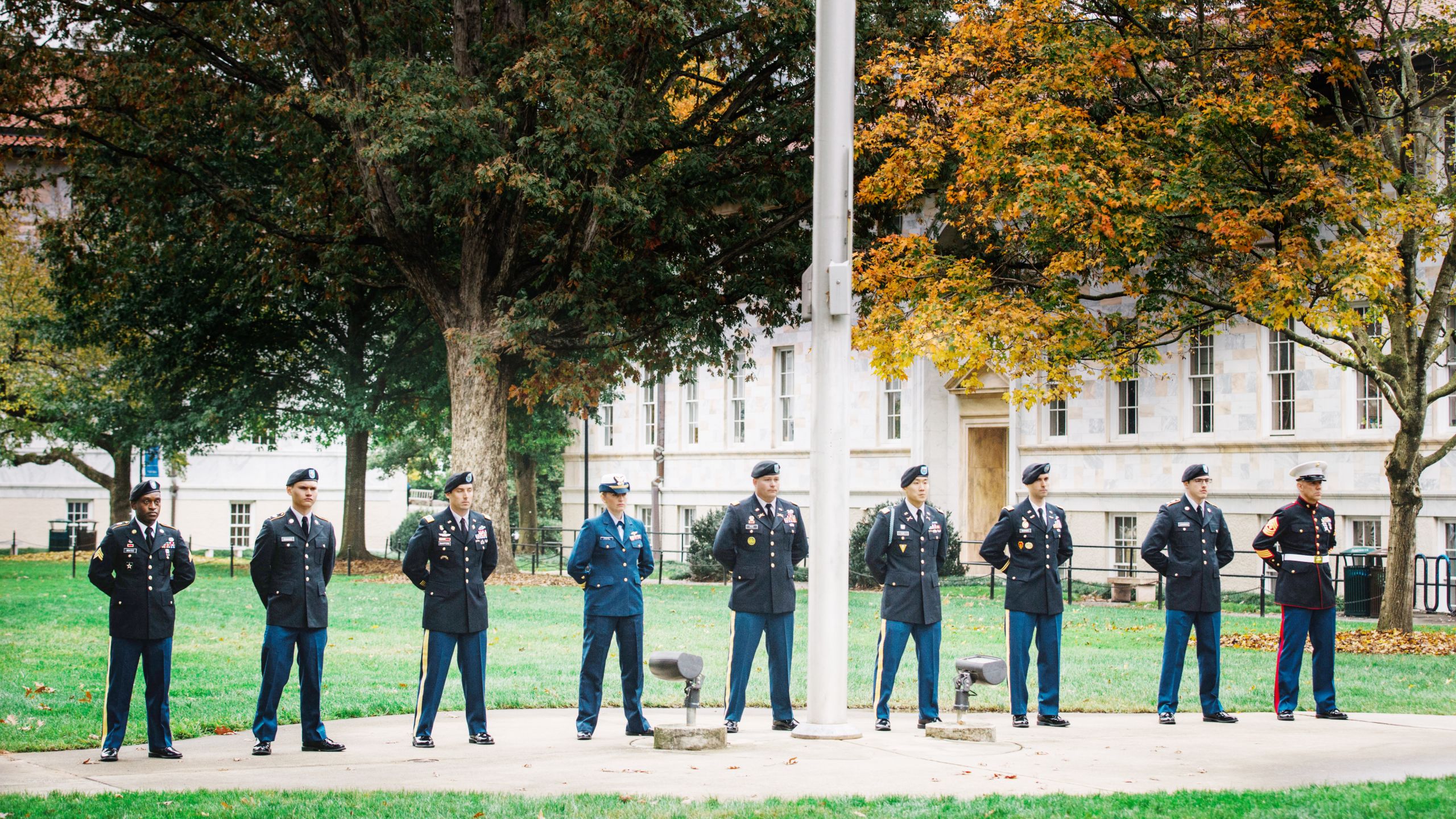
Timothy Banik was 17 when he decided he wanted to follow his brother into the U.S. Marine Corps, enlisting while he was still in high school through a delayed entry program.
After serving four years, with two overseas deployments to combat zones, he was only 21 when he was discharged in 2010, but felt worlds older than his “peers” when he tried to resume his civilian life by enrolling in college.
“I wasn’t feeling any connection with the 18- and 19-year-old kids I was going to school with. I felt disconnected from everyone who was not a veteran,” he says. “It was a struggle between allowing myself to understand these kids who had no idea what war is and also living with what I had seen and done in Iraq.”
Banik struggled for years with post-traumatic stress disorder (PTSD), sometimes attempting to drown his pain with alcohol, unable to reconcile the civilian world with his military experiences.
“It was really hard because I’d hear people complaining about the price of gas going up and I was thinking that there was probably someone getting killed right that moment in Iraq or Afghanistan, or dealing with some memory of my deployment,” he recalls.
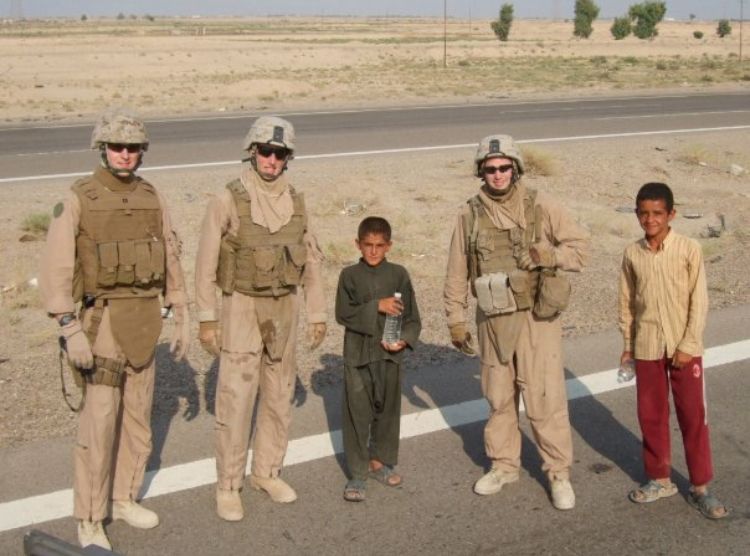
Timothy Banik (second from left) poses with Iraqi children and fellow Marines during his military service. Photo courtesy of Banik.
That finally began to change when his wife encouraged him to contact the Emory Healthcare Veterans Program, an innovative center that helps veterans and service members dealing with PTSD and other “invisible wounds.” Banik, now 30, completed its intensive outpatient program in February 2018.
“This program gave me the tools to be able to change my life. To realize that these experiences didn’t control or define me,” he says. “I was a 19- or 20-year old boy when that was happening, and now I had the tools — when memories came up — to acknowledge that it was there and that it happened and I could push through it.”
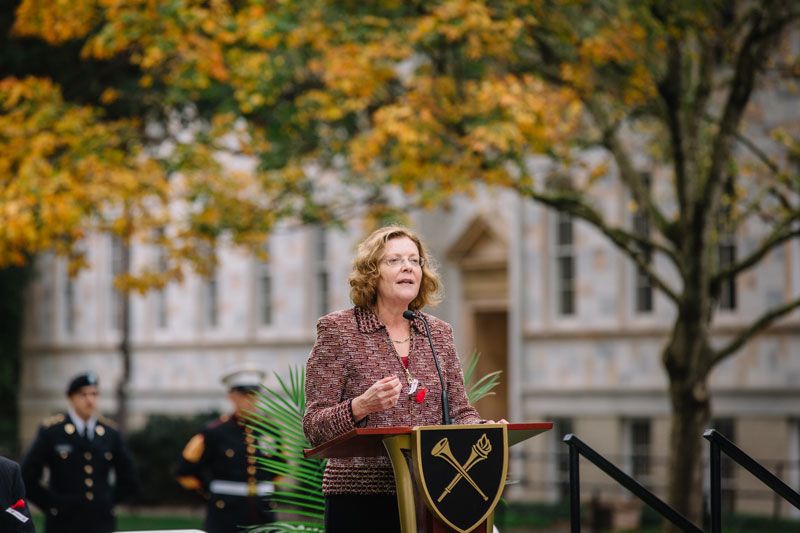
"It's quite difficult to in words express the gratitude that we feel for you as members of our community, to really give credit to the sacrifices that all of you have made over the course of your life." —Emory President Claire E. Sterk.

Timothy Banik (second from left) poses with Iraqi children and fellow Marines during his military service. Photo courtesy of Banik.
Timothy Banik (second from left) poses with Iraqi children and fellow Marines during his military service. Photo courtesy of Banik.

"It's quite difficult to in words express the gratitude that we feel for you as members of our community, to really give credit to the sacrifices that all of you have made over the course of your life." — Emory President Claire E. Sterk. Photo by Stephen Nowland.
"It's quite difficult to in words express the gratitude that we feel for you as members of our community, to really give credit to the sacrifices that all of you have made over the course of your life." —Emory President Claire E. Sterk.
Treating war's invisible wounds
The Emory Healthcare Veterans Program (EHVP) is one of four national programs that are part of the Warrior Care Network, providing clinical and family-centered treatment to veterans suffering from PTSD as a result of events from their military service, as well as military sexual trauma, traumatic brain injury, depression, anxiety and other related conditions.
The network connects post-9/11 veterans, regardless of their discharge status, deployment history or length of service, with individualized care for mental health issues.
“For so many of the people who go through our program, the results are transformative,” says EHVP director Barbara Rothbaum, a professor of psychiatry and behavioral sciences at Emory School of Medicine and director of Emory’s Trauma and Anxiety Recovery Program.
Opened in September 2015 with the help of a $15 million grant from Wounded Warrior Project, the EHVP received an additional five-year, $29.2 million-dollar grant from the organization in September 2018 to further its work providing transformative care for veterans.
The EHVP provides both a weekly outpatient program for veterans in the area and a two-week intensive outpatient program for veterans from all over the country. All services are provided at no cost to the veterans.
During the two-week program, veterans stay at a nearby hotel and spend carefully scheduled days filled with therapy, education, family and relationship counseling, sleep disorder management, yoga and other activities designed to help them regain control over their thoughts, emotions and lives.
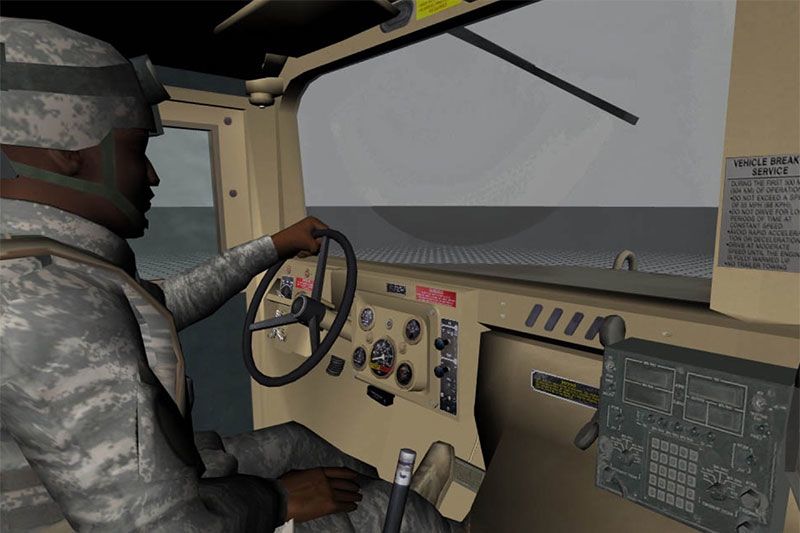
See what they see: Emory's virtual reality scenes can be adjusted to relate to a veteran's specific experiences.
Once veterans complete the program, Emory’s staff coordinates with a treatment team in the vet’s home community to ensure they will have proper follow-up care.
“We have families who tell us they even look better when they come home. It is amazing, in two weeks, what a difference it makes,” Rothbaum says. “Our patients have clinically and statistically decreased PTS and depression symptoms, and we are seeing a significant difference in the biomarkers — the psychophysiological measures of PTS — before and after the program.”
More than 1,100 veterans have been served through the Emory Healthcare Veterans Program since it was established.
This includes evaluation, case management and referral services to 1,138 veterans across the U.S, 273 Atlanta-area veterans in weekly outpatient treatment, and 282 participating in the two-week intensive outpatient program since February 2016.
The renewed support from the Wounded Warrior Project will increase the capacity of the EHVP to treat veterans.
“Soon we will double our space, which will double the number of veterans we are able to see,” Rothbaum notes. “We’ve really optimized the program to see as many veterans as we can for the providers and the space we have, so this will truly allow us to provide care to more veterans who are in need.”
In addition to expanding its facilities, the EHVP is working with partners — including the Blue Angels Foundation and the George W. Bush Institute's Warrior Wellness Alliance — to refer eligible veterans to the Emory Healthcare Veterans Program and the three other national centers in the Warrior Care Network.
Lt. Gen. (ret.) William “Burke” Garrett III serves as executive adviser to the EHVP. His military service included duties in key command and staff positions worldwide including serving as deputy commander of the U.S. European Command, where he provided leadership to address complex security challenges across 51 nations in Europe, Eurasia and the Middle East. He has combat experience in Afghanistan, Iraq and other conflicts.
“We lead to serve, and there is no greater privilege than serving the warriors who bravely stepped up for our great nation,” says Garrett.
The Emory Healthcare Veterans Program “enables and empowers our wounded warriors to live life to the fullest,” he says. “Being part of an organization committed to this important mission is an inspiration. There is nothing more honorable, nothing more noble, than doing good for others.”
Learn more about the services of the Emory Healthcare Veterans Program.

See what they see: Virtual reality scenes can be adjusted to relate to a veteran's specific experiences.
See what they see: Emory's virtual reality scenes can be adjusted to relate to a veteran's specific experiences.
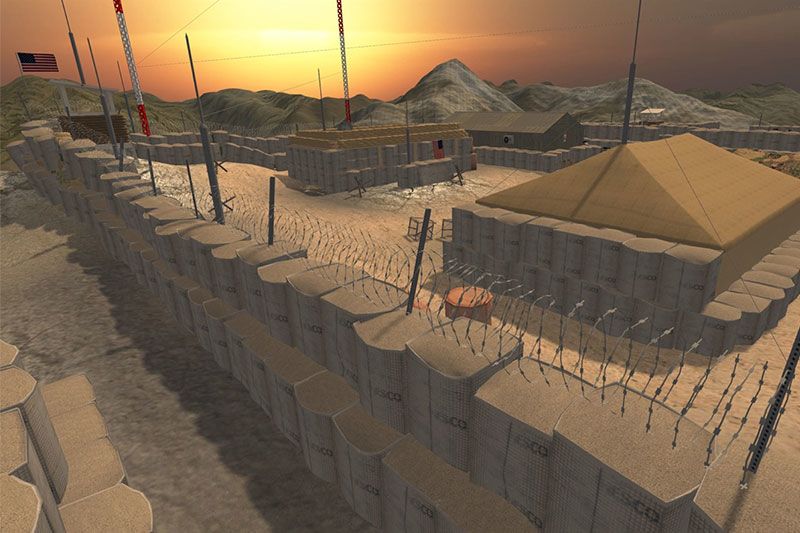
See what they see: Emory's virtual reality scenes can be adjusted to relate to a veteran's specific experiences.
See what they see: Emory's virtual reality scenes can be adjusted to relate to a veteran's specific experiences.
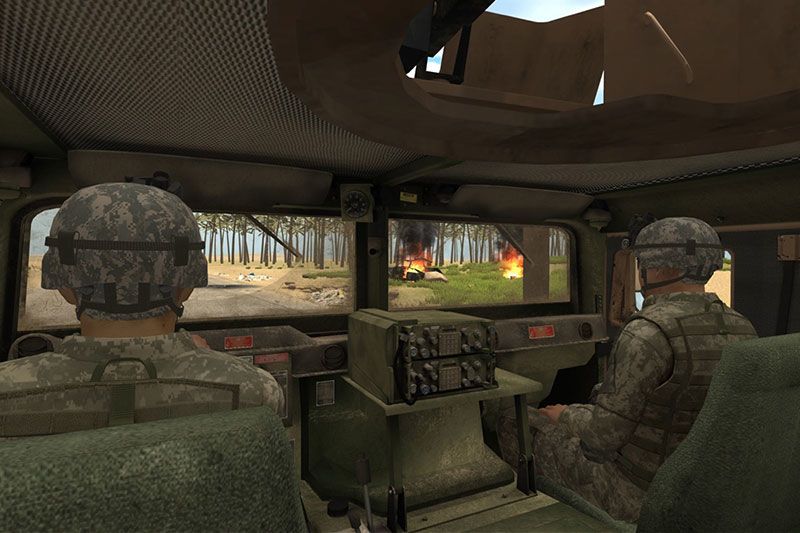
See what they see: Emory's virtual reality scenes can be adjusted to relate to a veteran's specific experiences.
See what they see: Emory's virtual reality scenes can be adjusted to relate to a veteran's specific experiences.
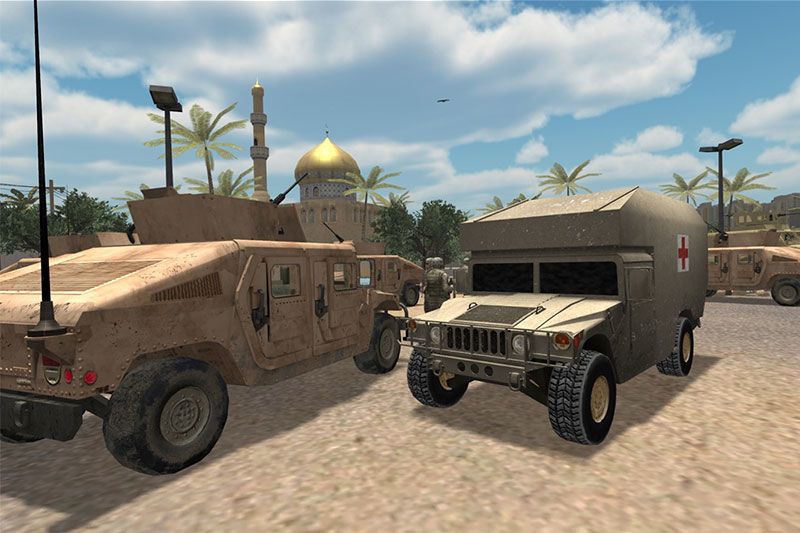
See what they see: Emory's virtual reality scenes can be adjusted to relate to a veteran's specific experiences.
See what they see: Emory's virtual reality scenes can be adjusted to relate to a veteran's specific experiences.
Facing fears with support
Rothbaum credits the program’s remarkable success rate — the EHVP has a 90 percent retention rate, compared to a 50 percent dropout rate in traditional programs — to a different model of care.
“PTSD is a disorder of avoidance. In typical PTSD treatment, these veterans are expected to open up and talk about all of this painful stuff, then stuff it all down again until the next session. Here (in the two-week intensive outpatient program) they are really eating, breathing and sleeping the program and they are doing it with a lot of other veterans who are also going through it and with a whole team and staff to support them,” she says.
Banik spent seven months in Fallujah, Iraq, on his first deployment in 2007, patrolling service roads with his platoon, searching vehicles and looking for improvised explosive devices. He was home a few months before he was deployed again in late 2008, this time in Sinjar, a town in northern Iraq near the Syrian border.
“We lived out of our trucks for five months, just out in the middle of Iraq. We’d wake up every day and do security patrols. We’d go village to village getting face time with the people,” Banik says. “I specifically remember, a vivid memory, going into a village a couple of days before I turned 21 and wondering if I was going to make it home to be able to drink a legal beer.”
Once he was discharged in 2010, Banik enrolled at Penn State University in his native Pennsylvania, but despite earning good grades he left to be near his family in Marietta, Georgia. He spent another year and a half at Kennesaw State University before dropping out.
Although he had a good job and even met his wife, Clara, whom he married in July 2017, Banik avoided many social situations and was drinking regularly to cope with symptoms of PTSD.
“She didn’t realize until we got married how much my military experience was affecting my mood and behavior. I didn’t want to go anywhere or try new things or venture out. I literally just had my safe spot. I’d go to work and then come home and that was it. No concerts, no Braves games,” he says. “She’s a very adventurous person and I saw it was hurting our relationship.”
It was Clara Banik who told her husband about the Emory Healthcare Veterans Program, which she’d learned about from a friend who is an Emory employee. Since completing the program, Banik and his wife have traveled to her native Spain for him to meet her extended family and he has been much more open to new adventures.
“Our life is so different now. I’m doing things I never would have done before. There are moments when she wants to do something and my first instinct is to resist it, but I can work through that and be able to try it,” he says. “My wife would say I am 100 percent different. She is proud of me and of what I am doing to help promote the Emory Healthcare Veterans Program.
“I just want every veteran to know that change is possible.”
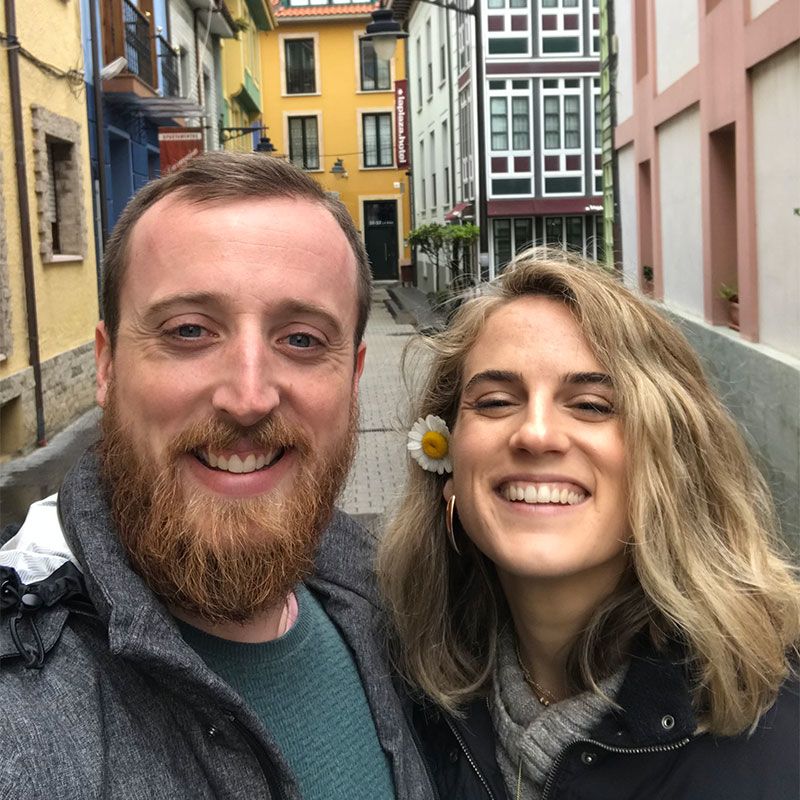
Timothy Banik poses for a selfie with his wife, Clara, on a recent visit to Spain — a trip he says would not have been possible without the skills he gained through the Emory Healthcare Veterans Program.
Timothy Banik poses for a selfie with his wife, Clara, on a recent visit to Spain — a trip he says would not have been possible without the skills he gained through the Emory Healthcare Veterans Program.
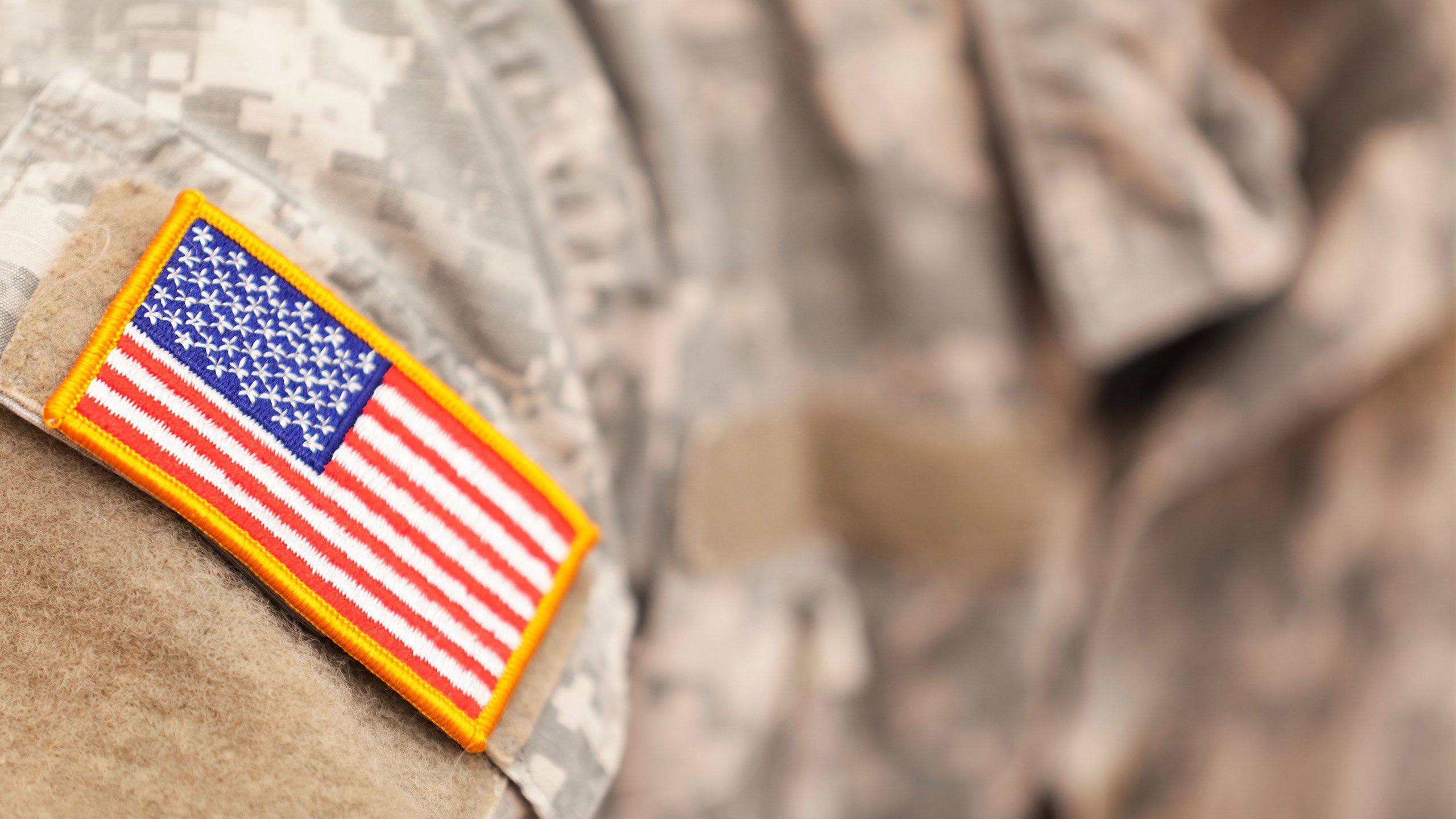
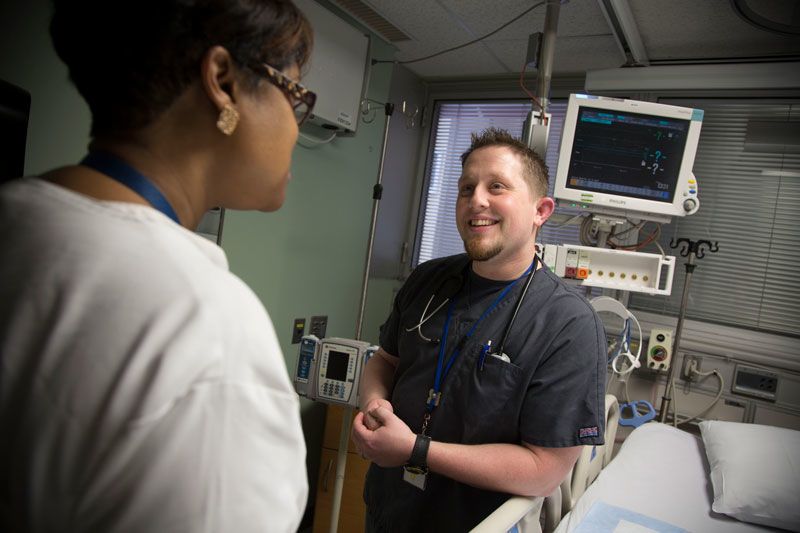
Isaac Newton was part of the first cohort of Emory students to complete the VA Nursing Academic Partnership (VANAP) program, graduating in May 2015. He is now a nurse at the Atlanta VA Medical Center. Photo by Bryan Meltz.
Isaac Newton was part of the first cohort of Emory students to complete the VA Nursing Academic Partnership (VANAP) program, graduating in May 2015. He is now a nurse at the Atlanta VA Medical Center.
Training the next generation of care providers
As the Emory Healthcare Veterans Program helps veterans like Banik find hope and healing, Emory’s Nell Hodgson Woodruff School of Nursing is training the next generation of nurses to care for veterans.
Emory is one of 18 competitively selected U.S. nursing schools chosen by the Department of Veterans Affairs to take part in the VA Nursing Academic Partnership (VANAP) and VA Nursing Academic Partnership for Graduate Education (VANAP-GE).

Isaac Newton was part of the first cohort of Emory students to complete the VA Nursing Academic Partnership (VANAP) program, graduating in May 2015. He is now a nurse at the Atlanta VA Medical Center.
“We know that veterans who seek care within VA health systems have more chronic conditions than the general population and many of these conditions are complicated by the visible and invisible injuries of war. These educational programs prepare highly qualified, bright nursing students to provide veteran-centered care both within the VA medical system or in the community setting,” says Lisa Muirhead, associate professor of nursing, who serves as principal investigator for both programs and co-director of the graduate program.
In addition to two years of nursing courses at Emory, undergraduate students perform clinical rotations at the Atlanta VA Health Care System.Undergraduates are trained in various aspects of veteran care, including mental health, traumatic brain injury, home-based health, women's health and homeless care.
Graduate students receive advanced training in primary care, women's wellness, mental health, geriatrics, home-based primary care, palliative care and HIV/AIDS care. When they graduate, students are eligible to sit for the national certification exam in adult-gerontology primary care nurse practitioner or adult-gerontology acute care nurse practitioner specialties.
The VANAP program is helping build nursing capacity for both inpatient and outpatient care. Since it was instituted in 2013, 84 BSN students have completed the Emory program, with another 45 students currently enrolled.
The VANAP-GE program, which began in August 2015, has seven graduates and 15 are currently enrolled. In addition, VANAP-GE includes a residency program for board-certified nurse practitioners who complete 12 months of training in the Atlanta VA Health Care System. Eight residents have completed the program and five are currently in residency.
“The challenge in the U.S. health care system is providing care of varying complexity to our veterans that meet their unique health care needs,” Muirhead says. “These educational programs are innovative initiatives, designed to improve access and provide a cadre of well-qualified nurses and advance-practice nurses to address the needs of our veterans.”
When the issues are legal
Emory’s support for veterans reaches beyond providing health care. The Emory Law Volunteer Clinic for Veterans provides pro bono legal services, including claims for service-connected disability and applications for discharge upgrade and record correction for veterans with PTSD and TBI.
Founded in 2013 through the support of the military-veterans section of the Georgia Bar Association and the Military Legal Assistance Program, the clinic was launched to provide free legal assistance to veterans struggling to find their way in the system.
Keely Youngblood, a 2016 Emory Law graduate, is now the clinic's first full-time staff attorney, helping supervise law student volunteers and pro bono volunteers, as well as serving as the lead attorney on many cases.
Within the 2017-2018 fiscal year, the clinic has recovered over $600,000 in annual disability benefits for veterans.
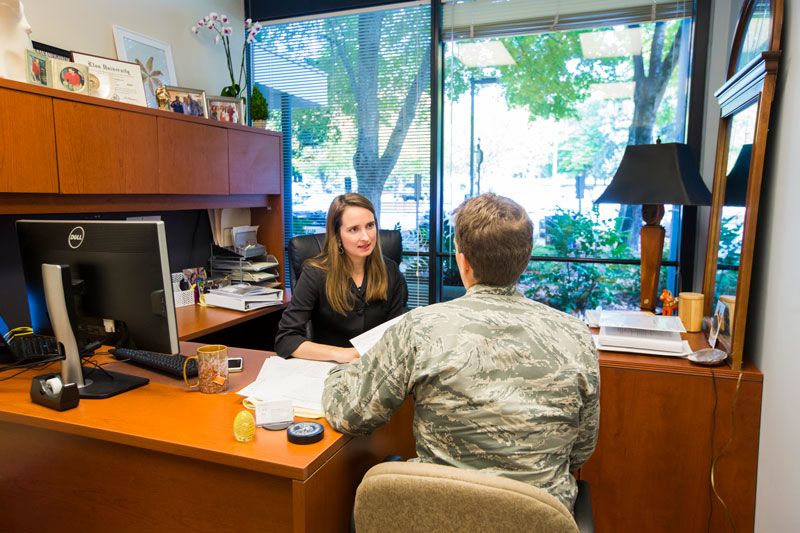
Keely Youngblood, director of the Emory Law Volunteer Clinic for Veterans, meets with a client. Photo by Kay Hinton.
Keely Youngblood, director of the Emory Law Volunteer Clinic for Veterans, meets with a client. Photo by Kay Hinton.
"Within the past year, we secured a victory in what started off as one of my first cases," Youngblood says. "It took us two years to secure PTS disability benefits for a Korean war veteran who had received a Purple Heart. He was in combat for months, took a bullet to the leg, and had shrapnel scars in his eyes."
The clinic has been able to expand its services thanks to a new partnership with Duane Morris Law Firm and Home Depot. Through the partnership, at least 50 veterans have received estate work including wills at the Atlanta VA Health Care System.
Clinic volunteers also work with veterans on “Military Mondays,” a twice-monthly law clinic at a local Starbucks coffee shop.
“It was there that we met a grandmother whose son was killed in Iraq and who was raising her grandson in his place. Through administrative error, the VA had levied a debt of $50,000 against her grandson, claiming that they had accidentally overpaid him and seeking the money back,” Youngblood says. With a volunteer attorney editing the work of an Emory law student, the clinic successfully secured a waiver for the debt.
The clinic currently has more than 50 open cases, and has aided in the recovery of some $4.7 million in expected lifetime benefits for its clients, who range from World War II veterans to those only recently discharged from active duty.
The clinic also has secured discharge upgrades for clients who were discharged from active duty under a less than fully honorable discharge because of behavior that was only later discovered to be severe PTSD. Moving forward, the clinic hopes to build more services that protect veterans from erroneous discharges and misdiagnoses.
"We have recently started work on representing a few veterans who came back from Afghanistan with both severe injuries and opioid addictions,” Youngblood says. “There's more awareness now, but for the past decade, units responded to medical injuries in the field by handing out painkillers.
“It was hard to monitor painkiller use in the trenches of war in Afghanistan, especially use by young soldiers who felt obligated to get out there combat-ready every day, even if that meant an extra pill. There are many veterans who are still living with the consequences of that."
The clinic had four full-time interns over the summer and has eight student volunteers this fall. In the past year, at least five young Emory law alumni have also volunteered with the clinic, Youngblood says.
“We started off as a small clinic and I attribute part of our growth story to our ability to give Emory Law students experiential learning by pairing them with attorneys in the Atlanta community who are interested in taking on work pro bono,” she explains. “The attorneys can then do pro bono work they might not otherwise be able to do because they have helping hands.
“It's a win for everyone, and gets veterans the attention they deserve.”
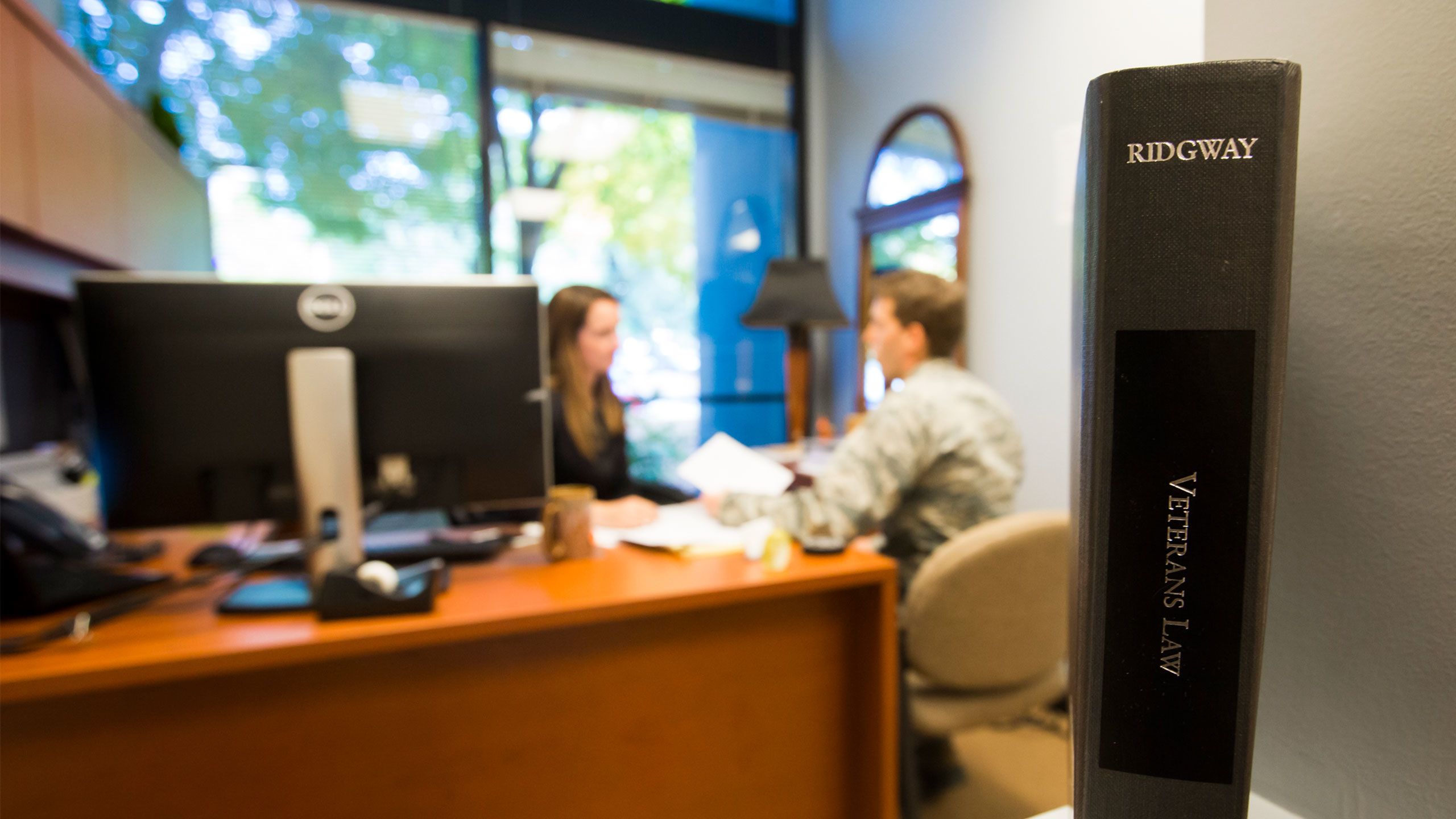
Support for veterans
as students

Jesse Sladek, a student in the executive MBA program at Emory’s Goizueta Business School, graduated from West Point Military Academy in 2006 and was immediately commissioned as an infantry officer in the U.S. Army.
He served in Iraq and Afghanistan during peak combat surges in the 82nd Airborne Division and on two special operations tours with the 75th Ranger Regiment, which was formerly commanded by retired Lt. Gen. Ken Keen, now associate dean of leadership development at Goizueta.
“My first six months of transition out of the military were difficult. I had trouble adjusting to the new rules and new culture of the corporate world,” says Sladek, who also has a fulltime job in a leadership development program at GE. “When I had trouble, I reached out to fellow West Point graduates and other combat veterans. Whenever I made a call, that person told me what I needed to hear. I was given that help and I want to give that back.”
Since enrolling at Emory in 2017, Sladek has become president of the Emory Veterans Association, a student-run group focused on providing support and opportunity for student veterans at Emory.
“Our goal is three-fold: to make Emory a top destination for student veterans, to provide networking and developmental opportunities for veterans at Emory, and also to volunteer in the community,” Sladek says.
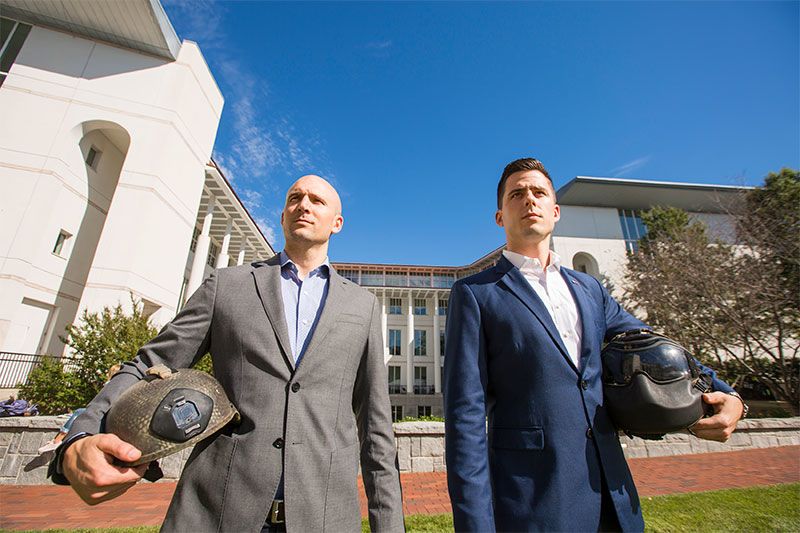
Emory students Jesse Sladek (left), an Army veteran, and Tyler Freeman, a Marine veteran, are working to help those who have served in the military know that they will find a supportive community at Emory.
Emory provides veterans' education benefits through all of the undergraduate and graduate schools that make up the university. Through the Yellow Ribbon Program, degree-granting institutions of higher learning in the U.S. voluntarily enter into an agreement with the Veterans Administration to fund tuition expenses that exceed the annual VA tuition and fees benefit.
In 2017, Emory contributed over $1.6 million in education support to veterans across the university’s nine schools and colleges.
Goizueta Business School currently has the largest per capita veteran population of any school on campus, with 42 student veterans.
Undergraduate students planning military careers can participate in Army or Air Force ROTC through a cross-enrollment agreement with Georgia Tech. Students complete their undergraduate degrees at Emory and military training at Tech.
The Emory Veterans Association has received encouragement and support from several high-profile veterans at Emory, including Keen, Garrett and public health research professor Kirk Elifson — husband of Emory President Claire E. Sterk — who served as a captain in combat intelligence for the U.S. Army during the Vietnam War.
Emory is also a member of VetLink, a partnership with the nonprofit Service to School, whose mission is to help transitioning military veterans gain admission to the best college or graduate school possible, and to help select universities and colleges committed to increasing veteran enrollment on their campuses.
“Veterans are traditionally underrepresented at top universities. A lot of veterans think they can’t get in, and then comes the cost factor. Whether they are public or private, top colleges and universities are often the most expensive in the state,” says Tyler Freeman, a Marine veteran and dual MBA/juris master degree candidate at Goizueta and Emory Law. “Emory does a great job of saying to our veterans who are here, ‘Here’s how we are going to help you afford it.’”
In addition to robust admission advice and financial support, veterans are also seeking “the community feel that they had when they were in service,” Freeman says. To this end, the Emory Veterans Association hopes to set up a mentoring program to pair new student veterans with peer veteran mentors to help them adjust to the university culture.
“These students need to find people who have something in common, someone who relates to them and who they can off the bat associate with, and that is the first part of developing that community,” Freeman says.
“We want veterans to know, when they are looking at Emory, that they will be able to find the resources they need.”

Emory students Jesse Sladek (left), an Army veteran, and Tyler Freeman, a Marine veteran, are working to help those who have served in the military know that they will find a supportive community at Emory. Photo by Ann Watson.
Emory students Jesse Sladek (left), an Army veteran, and Tyler Freeman, a Marine veteran, are working to help those who have served in the military know that they will find a supportive community at Emory.

Want to learn more?
Visit Emory University and the Emory News Center.


